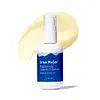What's inside
What's inside
 Key Ingredients
Key Ingredients

 Benefits
Benefits

 Concerns
Concerns

 Ingredients Side-by-side
Ingredients Side-by-side

Aloe Barbadensis Leaf Juice
Skin ConditioningHelianthus Annuus Seed Oil
EmollientGlycerin
HumectantCoco-Glucoside
CleansingCoconut Alcohol
EmollientPopulus Tremuloides Bark Extract
AntiseborrhoeicAscorbic Acid
AntioxidantRosa Canina Seed Extract
EmollientButyrospermum Parkii Butter
Skin ConditioningLeontopodium Alpinum Meristem Cell Culture
Skin ConditioningHydrogenated Lecithin
EmulsifyingGlyceryl Caprylate
EmollientSclerotium Gum
Emulsion StabilisingRosa Damascena Flower Oil
MaskingCitrus Sinensis Peel Oil Expressed
PerfumingRosmarinus Officinalis Leaf Extract
AntimicrobialBisabolol
MaskingSodium Anisate
AntimicrobialLactic Acid
BufferingXanthan Gum
EmulsifyingAloe Barbadensis Leaf Juice, Helianthus Annuus Seed Oil, Glycerin, Coco-Glucoside, Coconut Alcohol, Populus Tremuloides Bark Extract, Ascorbic Acid, Rosa Canina Seed Extract, Butyrospermum Parkii Butter, Leontopodium Alpinum Meristem Cell Culture, Hydrogenated Lecithin, Glyceryl Caprylate, Sclerotium Gum, Rosa Damascena Flower Oil, Citrus Sinensis Peel Oil Expressed, Rosmarinus Officinalis Leaf Extract, Bisabolol, Sodium Anisate, Lactic Acid, Xanthan Gum
Water
Skin ConditioningGlycerin
HumectantTetrahexyldecyl Ascorbate
AntioxidantCaprylic/Capric Triglyceride
MaskingHydroxyethyl Acrylate/Sodium Acryloyldimethyl Taurate Copolymer
Emulsion StabilisingCaprylyl Glycol
EmollientHydrogenated Lecithin
EmulsifyingDimethicone
EmollientCyclopentasiloxane
EmollientMaltodextrin
AbsorbentPhenoxyethanol
PreservativeHexylene Glycol
EmulsifyingBisabolol
MaskingTocopheryl Acetate
AntioxidantCitrus Aurantium Dulcis Peel Oil
MaskingCitrus Limon Peel Oil
MaskingMicrocrystalline Cellulose
AbsorbentSodium Acrylates Copolymer
Alaria Esculenta Extract
Skin ProtectingSyringa Vulgaris Leaf Cell Culture Extract
Skin ConditioningHydrogenated Polydecene
EmollientUndaria Pinnatifida Extract
Skin ConditioningPhospholipids
Skin ConditioningHelianthus Annuus Seed Oil
EmollientPolyglyceryl-10 Stearate
Skin ConditioningCellulose Gum
Emulsion StabilisingSodium Hyaluronate
HumectantWater, Glycerin, Tetrahexyldecyl Ascorbate, Caprylic/Capric Triglyceride, Hydroxyethyl Acrylate/Sodium Acryloyldimethyl Taurate Copolymer, Caprylyl Glycol, Hydrogenated Lecithin, Dimethicone, Cyclopentasiloxane, Maltodextrin, Phenoxyethanol, Hexylene Glycol, Bisabolol, Tocopheryl Acetate, Citrus Aurantium Dulcis Peel Oil, Citrus Limon Peel Oil, Microcrystalline Cellulose, Sodium Acrylates Copolymer, Alaria Esculenta Extract, Syringa Vulgaris Leaf Cell Culture Extract, Hydrogenated Polydecene, Undaria Pinnatifida Extract, Phospholipids, Helianthus Annuus Seed Oil, Polyglyceryl-10 Stearate, Cellulose Gum, Sodium Hyaluronate
Ingredients Explained
These ingredients are found in both products.
Ingredients higher up in an ingredient list are typically present in a larger amount.
Bisabolol is famous for its skin soothing properties. It does this by blocking inflammatory signals, helping to reduce your body's reaction to irritation.
This ingredient also interferes with the process of hyperpigmentation. This can help with reducing dark spots and uneven tone.
Bisabolol is an antioxidant. Antioxidants help fight free-radicals. Free-radicals are molecules that may damage your skin cells. By fighting these free-radicals, Bisabolol may slow down signs of aging.
Studies have shown Bisabolol to have antimicrobial properties and may be a fungicide. These properties help preserve a product's shelf life.
All these properties makes bisabolol a great skin barrier helper ingredient.
Bisabolol also helps the absorption of other ingredients.
Note: Synthetic Bisabolol has been shown to be less effective.
Learn more about BisabololGlycerin is already naturally found in your skin. It helps moisturize and protect your skin.
A study from 2016 found glycerin to be more effective as a humectant than AHAs and hyaluronic acid.
As a humectant, it helps the skin stay hydrated by pulling moisture to your skin. The low molecular weight of glycerin allows it to pull moisture into the deeper layers of your skin.
Hydrated skin improves your skin barrier; Your skin barrier helps protect against irritants and bacteria.
Glycerin has also been found to have antimicrobial and antiviral properties. Due to these properties, glycerin is often used in wound and burn treatments.
In cosmetics, glycerin is usually derived from plants such as soybean or palm. However, it can also be sourced from animals, such as tallow or animal fat.
This ingredient is organic, colorless, odorless, and non-toxic.
Glycerin is the name for this ingredient in American English. British English uses Glycerol/Glycerine.
Learn more about GlycerinHelianthus Annuus Seed Oil is the oil derived from the seeds of a Sunflower. Sunflower seed oil is non-fragrant. It is an emollient, meaning it helps to soften the skin.
Sunflower seed oil contains many fatty acids. The fatty acids found in sunflower seeds include (from highest amount to least): linoleic acid, myristic acid, palmitic acid, stearic acid, arachidic acid, oleic acid, and linolenic acid.
These fatty acids help the skin create ceramides. Ceramides play a role in repairing the skin barrier.
Helianthus Annuus Seed Oil helps moisturize the skin. This in turn helps the skin look more rejuvenated and smoother.
Sunflowers are rich in vitamin E.
Historians believe Indigenous cultures of North America domesticated sunflowers before corn. Thus they relied on sunflower oil for a variety of uses. One such use is moisturizing skin and hair.
Sunflower seed oil may not be fungal acne safe. We recommend speaking with a professional if you have any concerns.
Learn more about Helianthus Annuus Seed OilHydrogenated Lecithin is created from the hydrogenation of lecithin (a group of phospholipids). Hydrogenation is a chemical reaction between hydrogen and another element.
This ingredient is an emollient and emulsifier. As an emollient, it helps soften skin by trapping moisture within. As an emulsifier, it prevents oil and water ingredients from separating.